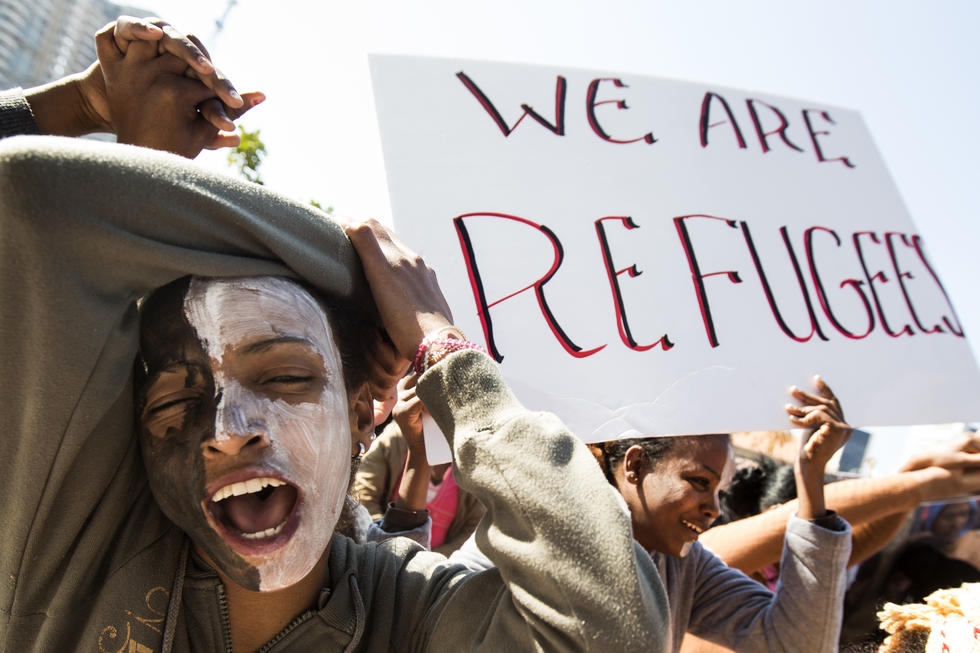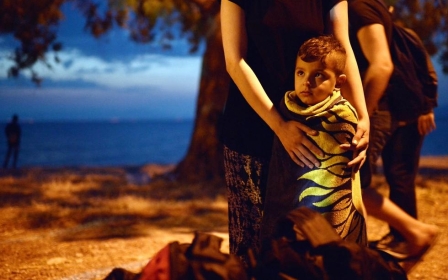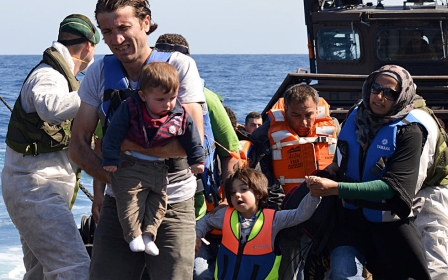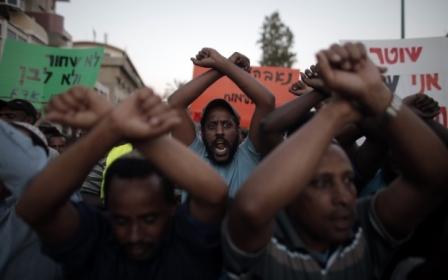Asylum seekers: Fortress Europe with Israeli guns

The EU has recently adopted a plan to use extreme measures to restrict the flow of asylum-seekers from Africa and the Middle East, who cross the Mediterranean in a desperate attempt to save themselves and their families from war and famine. According to a Wikileaks-revealed document, the EU has decided to sabotage the boats which the refugees use to cross the sea, so that their deaths will not occur on European soil.
The rising extreme right-wing in Europe chooses to forget that these people are driven to flight by crises in which Europe plays a central - albeit not the only - role. Drought, desertification and crop-death are a result of climate-change which was brought about by the industrial world. War - mostly civil - on a massive scale is fuelled by European weapons as five out of the top 10 arms exporters in the world are members of the EU. Economic exploitation and unfair trade agreements have entrenched poverty in Africa and the Middle East, and contribute to political instability.
The war against the refugees is fought on two levels. On the physical level, European governments establish mechanisms to detect asylum-seekers, to hinder their journey and to contain them before they arrive in Europe. If they do arrive, European governments attempt to make the asylum-seekers the responsibility of the first European country in which they set foot. The second level is the war of legitimacy, in which European governments attempt to portray the refugees as a dangerous and negative influence on European society, to convince the public that state violence against the refugees is legitimate and that Europe bears no responsibility for the refugee’s dire circumstances.
Israeli technologies
Europe is one of Israel’s major export markets for arms. In 2014, Israeli exports to Europe amounted to US$724 million, 13 percent of the total Israeli arms exports for that year. While Israel is amongst the largest weapon exporters in the world, it is not the biggest. It is, however, the capital of homeland-security technology. Homeland security is technology developed to monitor, control and manage civilian populations. Israeli companies build drones with the capability to remain long hours in the air and send footage; they produce sophisticated surveillance equipment, write data-mining programmes that collect private information to create files on people based on data collected against them; and train security guards.
These technologies are not the kind that win wars, but rather the kind of technologies which enable governments to control civilian populations and prevent civil resistance. It is exactly the kind of technology which is needed in order to control the flow of human beings from Africa and western Asia.
Indeed, Israeli companies play a key role in the European security market, and the EU itself seeks to include Israeli security companies in European security projects. Thus Israel plays a major role in the European physical war against the asylum-seekers, in an exchange which brings income to Israeli military and security companies and brings Israeli technologies to seal the gates of “Fortress Europe”.
Israel the model
More important than the technologies themselves is the political justification. Here Israel plays a central role not only in the physical war against the asylum-seekers, but also in the war of legitimacy. Israel’s treatment of asylum-seekers from Africa is among the most extreme examples of disregard to the rights of the refugees. The Israeli government denies the right of millions of Palestinian refugees to return to Israel, and is therefore loath to create a precedent by acknowledging the refugee status of the asylum-seekers.
The “Prevention of Infiltration Law,” which was passed in 1954 was designed to legalise the use of force against Palestinians trying to return to their homes (and at the same time calling them “infiltrators”). The same law is applied against African asylum-seekers today. The law was amended in 2011 to allow the government to arrest the asylum-seekers and incarcerate them for three years without a trial.
The Israeli government built the “Holot” incarceration facility to hold thousands of African refugees, most of them from Sudan and Eritrea. Although the Israeli High Court demanded the closure of the detention centre, the Israeli government continues to send refugees to be incarcerated there. Meanwhile, the Israeli government approved massive cuts in social spending to finance a long fence along the border with Egypt to physically block the asylum-seekers from entering, further fortifying Israel with yet another wall.
Like European countries, Israel denies its responsibility in contributing to the humanitarian catastrophe which is unfolding in Eritrea and in Sudan, but some Israelis have held a demonstration on 2 June, to bring to light the Israeli arms sales to South Sudan, which help to destabilise the region.
The large number of refugees fleeing for their lives and arriving at countries which do not welcome them and treat them with hostility has put the European right-wing in the same political camp as the Israeli government. Israeli policies towards asylum-seekers are currently more aggressive than the European ones, but the European right is eager to copy Israel’s model: both its militaristic and xenophobic ideology, and its deadly array of technological means.
As long as this alliance lasts, it is no surprise that many European leaders choose to turn a blind eye to Israel’s violations of international law.
- Shir Hever is a graduate student at the Free University of Berlin, and an economist with the Alternative Information Centre.
The views expressed in this article belong to the author and do not necessarily reflect the editorial policy of Middle East Eye.
Photo: African asylum seekers, who entered Israel illegally via Egypt, hold up signs in English as they walk towards the Israeli Interior Ministry during a protest in the Mediterranean coastal city of Tel Aviv on February 11, 2014. (AFP)
Middle East Eye propose une couverture et une analyse indépendantes et incomparables du Moyen-Orient, de l’Afrique du Nord et d’autres régions du monde. Pour en savoir plus sur la reprise de ce contenu et les frais qui s’appliquent, veuillez remplir ce formulaire [en anglais]. Pour en savoir plus sur MEE, cliquez ici [en anglais].





